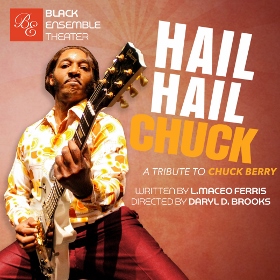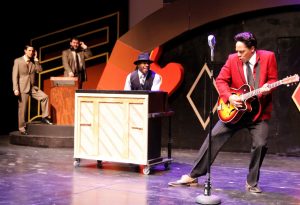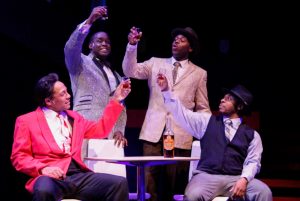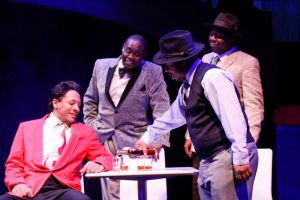JOHNNY BE BAD: A CHUCK ROAST
 Once more it’s homage time on Clark Street. The latest musical reclamation from Black Ensemble Theater, L. Maceo Ferris’s Hail, Hail Chuck: A Tribute to Chuck Berry is a very conditional salute to an early pioneer of rock and roll. As always with the company’s memory revues, we learn the price paid for the pleasure we got from B.E.T.’s wildly remembered icons of rhythm and blues.
Once more it’s homage time on Clark Street. The latest musical reclamation from Black Ensemble Theater, L. Maceo Ferris’s Hail, Hail Chuck: A Tribute to Chuck Berry is a very conditional salute to an early pioneer of rock and roll. As always with the company’s memory revues, we learn the price paid for the pleasure we got from B.E.T.’s wildly remembered icons of rhythm and blues.
Berry fought hard to make his music ’” and even harder to make money from it or anything else. Maybe too much so, considering an arrest in 1944 for armed robbery (the inspiration for “Thirty Days”) and another in 1962 for violating the Mann Act (acting as a possible pimp by taking a minor from Texas to Missouri), as well as his ruinous suits against managers presumably ripping him off and tax-evasion trouble with the government.
There was, it seems, a lot of grist in Berry’s mill, as his ballad “Reelin’ and Rockin’” torridly suggests. Though scant on providing a context for Berry’s contributions to the R & R genre, Ferris’s script nails the famed guitarist’s highs and lows ’” from breaking away from his stern father’s religious rigidity to discovering in St. Louis that white audiences craved the “black hillbilly” sound of “Sweet Little Sixteen.” That’s the bouncing ballad with which Vincent Jordan, as young Chuck, courts his future wife Themetta (Kylah Williams) to whom he will be married for 68 years when he dies in 2017 at the age of 90.
As narrated by the charismatic Lyle Miller as the older Berry, we appreciate Berry’s artistic partnership with his unacknowledged co-composer, pianist Johnny Johnson (played as young by Rueben Echoles and older by Kelvin Davis). Joining his trio and driven by the beats he learned from T-Bone Walker, Chuck Berry became a force and a phenom in the 1950s with a chart-climbing, quadruple whammy of seminal successes: “Maybellene,” “Rock and Roll Music,” “Roll Over Beethoven” and “Johnny B. Goode.” Thanks to Robert Reddrick’s reliably masterful musical direction (and his fabulous five-person combo), they’re fresher than tomorrow.
Happily, Berry’s good times — collaboration with Muddy Water (Dwight Neal) who gets the budding songsmith a recording contract at Chicago’s Chess Records, a gig on American Bandstand and, much later, immediate induction in to the Rock and Roll Hall of Fame in 1986 ’” can be summed up in songs. Berry transformed his high spirits into catchy numbers performed at his Club Bandstand in St. Louis and well-chronicled by Aaron Quick’s video projections.
There were other times too: We see the driven dreamer contending with Jim Crow segregation, hard-bargaining for tip money and cash payouts in advance, spats with Keith Richards (Jeff Wright), and endless tours in which he worked ever harder to recapture the pop magic that once ruled the juke box. His estrangement from Johnny Johnson is a bitter breakup, enough to make you question Berry’s gratitude and even genius. He also makes movies, excuses for grandstanding temper tantrums.
Though a bit strident in shouting as much as singing hits like “No Particular Place To Go” and “Nadine,” Miller drives home the spirit of these songs, finding the soul in each standard. Remarkably right, considering that he only inherited the role five days before opening afternoon, Jordan’s young crooner is Berry good. So are the rollicking rousers in this two-hour tour-de-tune: Muddy’s “I Got My Mojo Working,” “Who Do You Love,” “Almost Grown,” “Blue Monday,” and a pepped-up “St. Louis Blues.” The best tributes don’t spare the truth so Hail, Hail Chuck does Berry more than okay.
photos by Alan Davis
 Hail, Hail Chuck: A Tribute to Chuck Berry
Hail, Hail Chuck: A Tribute to Chuck Berry
Black Ensemble Theater Cultural Center
4450 N. Clark Street
Thurs at 7:30; Fri at 8; Sat at 3 & 8; Sun at 3
ends on April 1, 2018
for tickets, call 773.769.4451
or visit Black Ensemble Theater
for more shows, visit Theatre in Chicago








